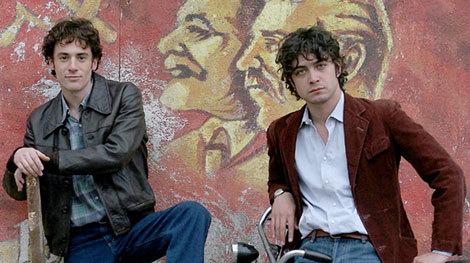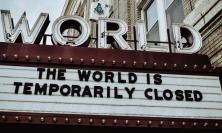Director: Daniele Luchetti
Starring: Elio Germano, Riccardo Scamarcio, Angela Finocchiaro, Diane Fleri
UK Release date: 4 April 2008
Certificate: 15 (124 mins)
“First, we’ll reason with him.” Manrico’s younger brother, Accio, has joined the fascists. It is Italy in the 1960s, a rundown village outside Rome, and Accio is listening to recordings of Mussolini’s speeches. Manrico busts open his brother’s door, slaps him round the head and reasons, “You’re an ass!”
My Brother is an Only Child charts the lives of this pair of brothers through the political life of the ‘60s and ‘70s. The motif of fraternal violence – both loving and competitive – runs throughout the film, using as its material the two ends of the political spectrum and Manrico’s girlfriend Francesca. Manrico is a communist; Accio’s fascist membership throws them into conflict. Lonely Accio falls in love with Francesca.
The former of these two conflicts – the political division between the brothers – isn’t completely satisfying. We aren’t given a chance to feel that this is a family riven by ideological differences, as the motivations of the two groups are only sketched in brief. Perhaps this is due to the fact of watching this film as a foreigner: no doubt for an Italian audience, the political history has much more of a resonance, or perhaps it is a deliberate ploy to direct the viewers’ attention back to the domestic life of the Benassi family. Accio’s near fanaticism is explained by the other characters as a consequence of sexual frustration rather than passionate adherence to ‘The Idea’; indeed, as is a near-prerequisite in films about boys growing up, when he does have sex he becomes a much more likeable individual.
Daniele Luchetti, the director, keeps the tone light, pulling back from dousing the screen with the human consequences of the violence until the very end of the film. There were enough moments to keep this Sunday afternoon audience giggling – the “de-Fascisization” of Beethoven’s Ode to Joy results in a rhythmically soulless roll call of Communist celebrities; when the teenage Accio demands something to do on joining the Fascists, he is ordered to go outside and play: he does so and announces to the boys playing table football, ‘I have been ordered to play’, giving them the fascist salute. Luchetti displays a subtly effective hand, generally keeping the metaphors suggestive rather than dictatorial: Accio receives driving lessons from his Fascist mentor, for example, or when he is left stirring three cups of coffee whilst Manrico and Francesca make love in the adjoining room.
Accio is by far the most intriguing character. His elder brother is the passionate, charismatic revolutionary made in the Che Guevara mould (see The Dreamers for a Parisian take on the 1968 revolutionary character) and the character relies on the considerable beauty of Riccardo Scamarcio to prevent it from thinning back into stereotype. Accio, on the other hand, is an irritating, vulnerable teenager looking for something to be a part of: his hands betray his yearning, whether they are performing the sign of the cross in the seminary in which he begins the film, giving the Fascist salute or the clenched fist of solidarity, they seem destined to mimic the motions of other people. One can imagine him today as one of the remaining ultras of Italian football.
The Church plays a small part at the beginning of the film, as the first of Accio’s destinations. The priests in the seminary are a humanized bunch, acting as the counterfoils to Accio’s furious onanist guilt – ‘punish me!’ he cries, to more laughter from the audience. It is refreshing to see the Church not being unthinkingly used as a trope to represent grinding conformity, stupid obedience and inhuman laws: although Accio experiences it as such (and that’s what he seems to be looking for), it is clear that this stems from his approach rather than an inherent characteristic of the institution itself.
My Brother is an Only Child is an enjoyable, well-made film and its positives outweigh any flaws in the characterisation. Despite the denouement being somewhat disjointed from the main story, I was left with several moments that will remain with me – usually a sign of a film worth seeing.
Nathan Koblintz






